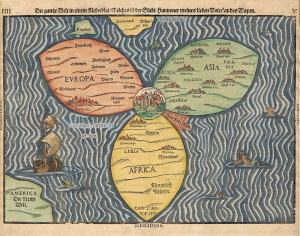By Mary Fairchild
1581 Bunting Clover Leaf Map; Israel in the center.
THE DEATH OF ELISHA—2 Kings 11-13; 2 Chronicles 22-24: After Ahaziah’s death, a sad sucession of events reveals THE WICKEDNESS OF MEN AND THE LONGSUFFERING AND JUSTICE OF GOD. In Jerusalem, Athaliah (the daughter of Ahab and Jezebel, and the wicked mother of King Ahaziah) usurped the throne and reigned for six years. Knowing that the throne rightfully belonged to the oldest son of king Ahaziah, she attempted to have all of her own descendants slaughtered so she could be the ruler. However, one of King Ahaziah’s sons, baby Joash, escaped death because he was hidden in the temple by his aunt Jehosheba, wife of Jehoiada the priest.
When Joash was seven years old, Hehoida the priest carefully planned for military protection and in the temple presented young Joash to the nobility of Judah. The royal crown was then placed on the boy’s head and the shout rang out in the Temple court, “God save the king!” Hearing the excitement, the queen (grandmother of the young Joash) rushed to the Temple. Her cry of “Treason! Treason!” was silenced when the priest ordered her to be slain outside the Temple. Joash, guided by godly Jehoiada, reigned for 40 years in Jerusalem and brought revival in Judah. Idols were destroyed that were brought into Judah by wicked Athaliah. Mattan, the priest of Baal was executed. (The northern kingdom of Israel had been purged of Baal worship by Jehu but the southern kingdom of Judah, though not strongly influenced by Baal, continued to be spiritually polluted by Athaliah who promoted her Baal worship in Judah just as he mother Jezebel had done in Israel. The root cause of Baal worship in Judah was the tragedy of Jahoshaphat’s affinity with Ahab.) Although Joash restored the true worship of God, he did not remove the pagan shrines.
Sometime after the 23rd year of Joash’s reign, his godly counselor Jehoiada died. (Jehoiada was 130 years old, much above the average lifespan of that day.) Influenced by new administrators, who were careless about following the Lord and who were more sympathetic toward the Baal cult, King Joash changed drastically. JOASH WAS SO INFLUENCED BY THE BAAL CULT, THAT HE HAD ZECHARIAH, JEHOIADA’S SON, STONED TO DEATH BECAUSE ZECHARIAH REBUKED HIM FOR HIS TOLERANCE OF IDOLATRY.
GOD JUDGED KING JOASH BY ALLOWING HAZAEL (king of Syria) to invade, murder, and plunder in Judah. Only by giving Hazael many of the holy treasures from the Temple was Joash able to avert a complete devastation in Jerusalem. As King Joash lay sick suffering from a disease, possibly from wounds inflicted by the Syrians, he was assassinated by his own servants. God had promised Jehu that four generations would succeed him on the throne of Israel. Jehoahaz reigned 17 years and followed in the footsteps of wicked Jeroboam, worshipping the golden calf. During his reign Israel continued to be stripped of monetary and military power by Hazael and Benhadad II of Syria. In answer to Jehoahaz’s prayer, God sent a “deliverer” to Israel, probably the Assyrian emperor who conquered Damascus in 803 B.C., thus relieving Israel of much of Syrian oppression.
Jehoash reigned after his father Jehoahaz’s death. The most notable event in his career as king was his visit to Elisha. When Joash went to his side, Elisha was ill with the disease from which he would die. Although Jehoash was a calf-worshipper, he honored and respected the prophet Elisha. Through an object lesson, Elisha predicted Jehoash’s victory over Syria. He told the king to hit the ground with his arrows. Jehoash did so, but only three times. Disturbed over this halfhearted display of effort, the prophet Elisha told Jehoash that he should have smitten the ground five or six times, for that was the number of times that he would defeat the Syrians. Now, Elisha said, he would win only three victories. But, in those three battles, Jehoash regained all the cities that the Syrians had taken earlier.
Elisha died during the reign of Jehoash, but after Elisha’s death an amazing miracle of resurrection occurred. A group of men who needed to quickly bury a dead body put it into Elisha’s grave. When the dead body touched Elisha’s bones, the dead man came back to life. This seemed to be God’s final tribute to the power He had given Elisha. Elisha left a prosperous farm to serve the man of God, Elijah. At Elijah’s translation (rapture), Elisha did not seek the position of Elijah but rather the power of Elijah—he asked for twice as much power as Elijah. In Elisha’s days the miraculous was almost commonplace, and Elisha performed twice as many miracles as Elijah. His miracles were primarily those of benevolence, protection, and help.
One of Elisha’s main interests was the training of young prophets for God’s service. Elijah had, no doubt, started the schools at Gilgal, Bethal, and Jericho, and these were continued and expanded under Elisha’s leadership. His purpose was to train the young men to HOLD BACK THE FORCES OF EVIL AND TO PREACH THE WORLD OF GOD in the sinful Baal-worshipping society of Israel. Today one man yielded totally to the will of God can have much influence. We need to pray for godly leaders daily and ask God to extend their ministry. We have no idea of the spiritual decline that might follow their death. The Word of God is full of promises to those who know the Lord. But do we respond halfheartedly, or in confident faith that the Lord will perform that which He has promised?
WORKS CITED
- Revelation and Church History
- Church Age
- Old Testament Study
- KING JAMES BIBLE
- MATTHEW HENRY COMMENTARY
- A Beka Book High School Bible Series “United Kingdom: Kings of Israel A;” 1995 Pensacola Christian College; www.abeka.com

